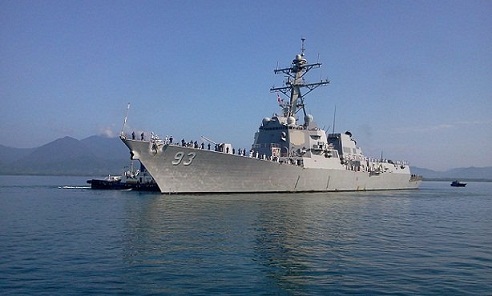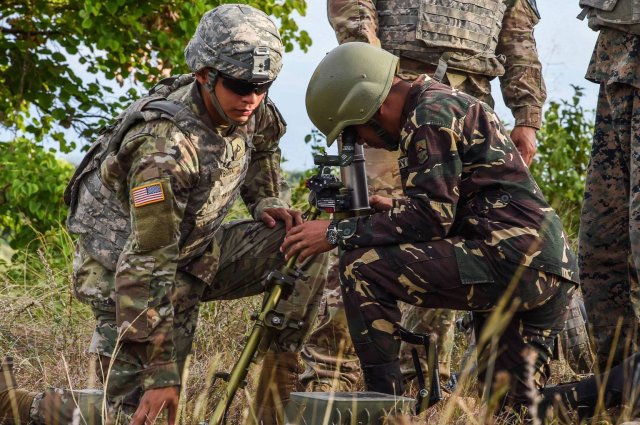By JONATHAN DE SANTOS
A non-government organization (NGO) has asked the Supreme Court (SC) to reconsider its decision to keep its hands off the issue of the controversial Visiting Forces Agreement (VFA), and help make U.S. military personnel in the Philippines answerable for their misdeeds under Philippine laws.
The NGO Center for International Law (Centerlaw) believes the SC has the jurisdiction to compel the Department of Foreign Affairs (DFA) to renegotiate custody arrangements for U.S. military personnel stationed in the Philippines.
Centerlaw said DFA should negotiate for an “appropriate agreement on detention facilities under Philippine authorities” as ordered by the Supreme Court in 2009.
Centerlaw said doing so will make the VFA — which it said is unfair, inequitable, and unconstitutional — more favorable to Philippine interests.
It also said the government should move for “abrogation [of the VFA] in case the Philippines cannot get a more equitable agreement.”
Centerlaw’s statements came as it filed a motion asking the High Tribunal to review a decision it had handed down in March, where the High Court said it did not have jurisdiction over custody issues that stem from a controversial rape case involving a U.S. Marine in 2005.
The SC decision came after the grounding of the USS Guardian at the Tubbataha Marine National Park in January and allegations that a U.S. Navy contractor dumped toxic waste in Subic Bay in late 2012.
Centerlaw chair Harry Roque said when the original motion was filed in February that “the Tubbataha incident makes it very clear why the [VFA] is not beneficial to the Philippines. It gives the Americans a pretense to ignore our national sovereignty and destroy our national patrimony.”
He said then that the crew of the USS Guardian was not even covered by the VFA since it was not clear why the ship was in the area at all.
The USS Guardian, a mining-countermeasures ship, ran aground on Tubbataha while en route to Indonesia from Subic in January. The Tubbataha Management Office had reportedly warned the Guardian crew that they were too close to the reef but those warnings were ignored.
The ship had to be decommissioned and broken up for salvage, a process that took until April. The U.S. brought the Guardian’s crew to Japan and subjected to an investigation by the U.S. military.
The U.S. attributed the grounding to faulty charts and has pledged compensation for the damage to the reef and an aid grant to a coral reef restoration project by Western Palawan University.
Centerlaw, in its motion in February, said the incident highlighted how difficult it is for the Philippines to enforce jurisdiction over U.S. troops in its territory.
It added the “blatant disregard for Philippine authority and the disrespect shown to the rangers of the Tubbataha Reef National Park by the crew of the USS Guardian show that the VFA is unable to ensure that Philippine authority will be respected by U.S. forces.”
The Supreme Court, in denying Centerlaw’s motion to have the DFA renegotiate custody arrangements, said it should have been filed at the court of origin of the Subic Rape Case. The 2009 decision Centerlaw cited stemmed from that case.
That case was heard by the Makati Regional Trial Court and the Court of Appeals which, in 2006, convicted a U.S. Marine for raping a Filipina in 2005.
The Court of Appeals overturned the conviction in 2009, but not before the Marine was transferred to the U.S. Embassy from the Makati City Jail, a move Centerlaw said was done “in the dead of the night.”
Under Article V, Section 6 of the VFA, U.S. military authorities may request to take custody of U.S. troops accused of crimes in the Philippines. The U.S. is meanwhile obligated to present its personnel at investigative and judicial proceedings.
That arrangement was brought under scrutiny by the inmate’s transfer to the U.S. Embassy after the rape conviction. The transfer was made possible by an agreement between the U.S. and the Philippines that the Supreme Court later said violated the provisions of the VFA.
The controversial transfer prompted former senator JovitoSalonga, BagongAlyansangMakabayan, and the victim’s lawyer to file petitions with the Supreme Court questioning the constitutionality of the Visiting Forces Agreement.
The petitions were consolidated and the Supreme Court ruled in February 2009 that the VFA was constitutional.
The SC also said in its decision the Foreign Affairs department should “forthwith negotiate with the United States representatives for the appropriate agreement on detention facilities under Philippine authorities.”
It made clear, however, that the VFA has separate provisions on custody and detention, with the provision on detention coming into force only after conviction. Under Article V, Section 10 of the VFA, detention of convicted U.S. troops will be by Philippine authorities and “shall be carried out in facilities agreed on by appropriate Philippines and United States authorities.”
Centerlaw’s motion in February was meant to remind the Supreme Court that the Department of Foreign Affairs had yet to act on the decision since 2009.
Roque, who called the denial of the motion puzzling, said in a press statement that the Supreme Court has jurisdiction over the motion since it is based on the SC’s decision on the Salonga petition.
“It did not originate from any lower court nor was it an original part of the rape case tried before the Makati City regional trial court,” he said.
Roque also said that “nothing bars the court from issuing a writ of execution to enforce a decision that, in the first place, solely originated from its final and executory judgment.”



